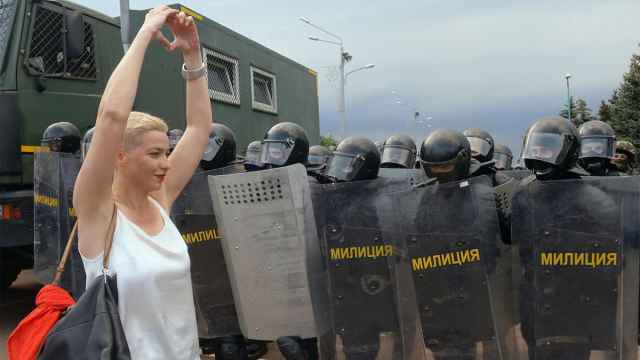KIEV — Ukraine's acting president and prime minister offered some of their strongest pledges yet on Friday to strengthen constitutional rights to use Russian language in an effort to defuse separatist protests.
In a joint televised address, acting President Oleksandr Turchynov and Prime Minister Arseniy Yatsenyuk called for national unity, urged people to refrain from violence and said they would support constitutional change and decentralizing more power to local councils, including over their official language — a central demand of Russian-speaking protesters in the east.
"The Ukrainian government is prepared to conduct comprehensive constitutional reform which will strengthen the powers of the regions," Yatseniuk said. This would include giving executive powers to locally elected officials in place of those currently appointed by central government, he said.
"We will strengthen the special status of the Russian language and protect this language," he added.
At present, millions of Ukrainians, including many who do not consider themselves ethnically Russian, speak Russian as a first language and have a right to use it for some official purposes in those regions where Russian-speakers are a majority.
The constitution already contains some protection for Russian and other languages but names Ukrainian, a related Slavic tongue, as the sole language of the state.
Many Russian-speakers feared the overthrow of the Kremlin-backed president in February could harm their interests, especially after Ukrainian nationalists in parliament attempted, ultimately in vain, to pass a bill abolishing Russian language rights.
Turchynov expressed disappointment that parliament had on Friday failed to unanimously support a draft of the proposed reforms. The former ruling Party of Regions, whose power base is in the Russian-speaking east, said the proposals fell short. The party wants Russian to have equal status with Ukrainian.
Turchynov, noting the approach of Easter on Sunday, said: "We call on all citizens to reach out their hands to each other, to refrain from radical actions and the language of hatred."
He stressed his desire for a "unitary Ukraine" — a phrase that combines the promise of decentralization with a rejection of the federal structure proposed by some easterners and by Russia. Kiev says that would lead to continued Russian interference and the eventual break-up of the Ukrainian state.
"To achieve peace and understanding among the citizens of Ukraine," he added, "regional, municipal and district councils will be given the right to decide to grant, within a particular area, alongside Ukrainian, the state language, official status to the Russian language or to another language spoken by a majority of the local population."
A variety of other languages are spoken in certain parts of Ukraine, notably Hungarian, Romanian and Slovak in the west.
Read more:
A Message from The Moscow Times:
Dear readers,
We are facing unprecedented challenges. Russia's Prosecutor General's Office has designated The Moscow Times as an "undesirable" organization, criminalizing our work and putting our staff at risk of prosecution. This follows our earlier unjust labeling as a "foreign agent."
These actions are direct attempts to silence independent journalism in Russia. The authorities claim our work "discredits the decisions of the Russian leadership." We see things differently: we strive to provide accurate, unbiased reporting on Russia.
We, the journalists of The Moscow Times, refuse to be silenced. But to continue our work, we need your help.
Your support, no matter how small, makes a world of difference. If you can, please support us monthly starting from just $2. It's quick to set up, and every contribution makes a significant impact.
By supporting The Moscow Times, you're defending open, independent journalism in the face of repression. Thank you for standing with us.
Remind me later.





